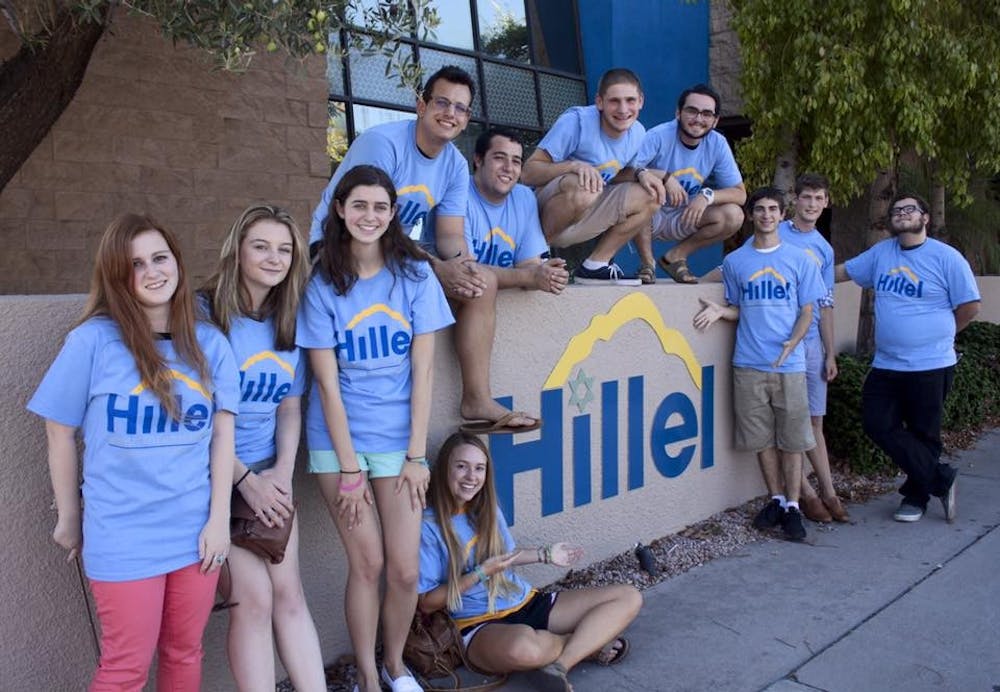Jewish students at ASU said religious organizations on campus are watching out for them, despite the feeling that there is an anti-Semitic sentiment brewing nationally.
Across America, anti-Semitic incidents have affected the Jewish population, and Tempe is no exception. Last week, swastikas were used to deface the library, said Josh Traulsen, the director of student life at Hillel, a Jewish organization on campus.
Students said they have also felt the hate personally.
Aleeza Kaplan, a nonprofit management junior, said she returned to her apartment near campus one evening to find her Mezuzah, a prayer scroll hanging on her doorway, “maliciously torn” from her door. She said this was a blatant act of disrespect toward Judaism, as Mezuzahs hold great cultural significance.
Kaplan said she was not surprised by the rise of anti-Semitism, as her people have experienced similar treatment “every day.”
“We’ve always known it was there,” Kaplan said. “We are affected by it every day. This is only new to everyone else.”
However, she said, ASU has always seemed like a safer place than other campuses across America.
“We have Michael Crow on our side,” Kaplan said. “We know nothing anti-Semitic will pass because of him, and that brings us comfort. I think ASU is doing what it can.”
Even though there are organizations and administrative members working to create a welcoming environment for Jewish students, some Jewish students have said certain professors have failed to handle the discussion of prejudice in a way that properly includes all cultures.
"I had a professor last semester who said anti-Semitism doesn't happen anymore," Kaplan said. "It happens every day."
Despite Kaplan and other Jewish students speaking with the professor after class about the incident, the professor did not issue any sort of apology. Kaplan said this left the Jewish students in the class feeling ostracized and trivialized.
Kaplan said recent pop culture references and jokes about the Holocaust are at least partially responsible for the upward trend of anti-Semitism among college students.
“Cards Against Humanity and big comedians make people think it’s okay to make these jokes, because when we see big people doing things it becomes a cultural norm,” she said.
One of the challenges faced by Jewish students are jokes that make their culture the punch line, jokes that some view as not humorous, but insensitive.
“It makes me feel attacked and belittled, like my culture is a joke," said mechanical engineering freshman Jessica Sherman.
Sherman said though she has not experienced a physically unsafe environment on campus, she has felt “scared and confused” about comments from fellow classmates.
In one of her classes, Sherman said she was shocked when a girl she considered a friend and knew she was Jewish, tried to justify the Holocaust to her.
She said the experience left her feeling deeply uneasy.
“I (had) never heard it from someone I didn’t consider an extremist,” Sherman said. “It made me feel like I might have to stop wearing my Hebrew ring.”
History freshman Hal Danesh, an active member of Hillel and Jewish Arizonans on Campus, agreed.
“What are they not seeing,” he said. “My grandparents were affected by this mass genocide. My great uncle was killed. It’s just an awful, awful thing.”
Danesh offered a solution to this kind of antagonistic humor, saying the key to a safe environment for Jews on campus was to create a culture of acceptance.
“Outreach is a solution,” he said. “On Rosh Hashanah, the day of the Jewish New Year, there was a Shofar blowing near the MU. It shows a small window into Judaism. A lot of people don’t know what Judaism is, and it would be good to have more understanding.”
Although anti-Semitic experiences have brought tension to the Jewish community at ASU, they said they aren't shaken.
Madeline Dolgin, Hillel’s innovation specialist, said she believes the Jewish people are able to survive and prosper by standing together.
“Everywhere Jews seem to go in history, we’ve been oppressed,” she said. “We’ve been pushed down, but we persevered. We find strength in other Jewish people.”
Shabbat, a Jewish celebration of the Sabbath observed every Friday at sundown to Saturday at sundown, provides a way for Dolgin and other followers of Judaism to find strength and resilience.
“(It is) something unique to the Jewish culture,” said Dolgin. “It is your faith bringing you into into the world by rallying your community. Shabbat is such a valuable, important thing in our society … a moment of mindfulness.”
Reach the reporter at mvbandal@asu.edu.
Like The State Press on Facebook and follow @statepress on Twitter.




